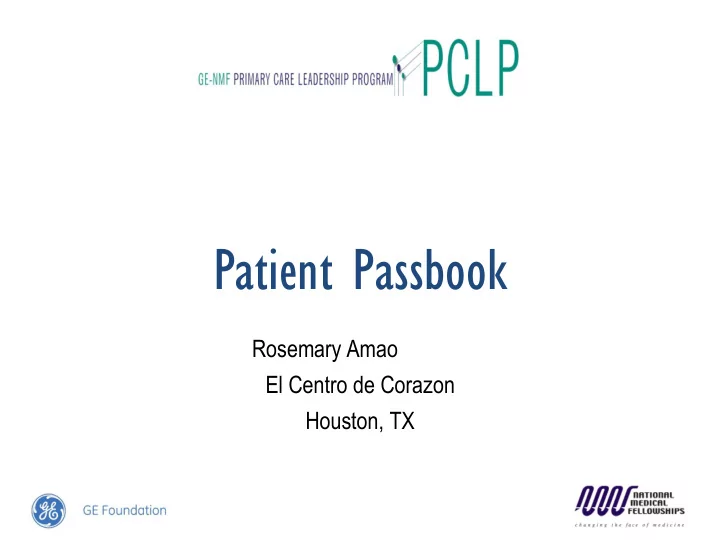

Patient Passbook Rosemary Amao El Centro de Corazon Houston, TX
Introduction • The needs of diabetic patients aren’t specific to effective glycemic control but also correspond to preventing complications and disabilities. • A healthy diet, physical activity, medication compliance, monitoring blood sugar and monitoring lipid levels have been found to positively correlate with good diabetic management and a reduction in complications. • Patients with diabetes have been shown to have a dramatic impact in the progression of their disease by participating in their own care. • While there are multiple factors that can be considered positive enforcers in facilitating self-management, the role of the Physician in managing ones care is key
Background • Type 2 Diabetes is one of the most prevalent chronic diseases in the United States, and the burden of this epidemic falls disproportionately on minorities and persons of low socioeconomic status. • The prevalence of diabetes in adults in Texas is higher than the national average and is much higher in Hispanics (12.3%) than in white non-Hispanics (8.5%). • Hispanics with diabetes experience a 50% to 100% higher burden of diabetes-related illness and mortality than non-Hispanics. • Individuals of Hispanic descent are less likely to receive recommended processes of care for patients with diabetes. • Hispanics are less likely to accomplish treatment goals such as glycemic control and lowering of cholesterol levels and blood pressure. • Poor compliance with Diabetes care guidelines and worse clinical outcomes in diabetic patients who lack insurance compared to insured patients. • Diabetes care is multifaceted and requires numerous strategies that go beyond glycemic control • Effective self-care can delay many of the detrimental side effects that come alongside this chronic condition, such as eye, foot and dental issues.
Methodology • The Patient Passbook will be implemented in the Eastwood clinic of El Centro and given to patients after being diagnosed with Type 2 Diabetes • Faculty involved include: Physician • Diabetic Counselor • Diabetic educator • Each faculty member will be trained on what the patient passbook entails and their role in its implementation. • • The patient passbook will allow patients to record a number of things, including: Glucose and A1C levels • Blood pressure • • Weight/BMI, • Lipid and Cholesterol levels • Lists of the patients medications • Records of their annual visits • Diet and exercise goals • Improvement to Diabetes self-management will be measured in a few different ways: How many patients bring their passbooks with them for each encounter • Whether each patient has their laboratory results communicated and written in their passbooks regularly. • Whether or not patients actually have an understanding of what their laboratory values mean • • Whether the patients at El Centro are actually seeing improvements in their overall health, via their laboratory results
Results • I foresee that the patients at El Centro will at least make an effort to keep up with their passbooks based on the excitement and enthusiasm that the patients seemed to have. • I will continue to follow up weekly with Dr. Young to access the progress of the passbook and will continue to work with El Centro to help with the success of the patient passbook in their Diabetic patient population.
Discussion • Patients who lack the necessary resources find it difficult to: • Keep appointments • Be on top of their medications • Follow through with the recommended diet and exercise plans • Having a self-care approach should help these patients over time keep better track of the steps they should be taking to ensure that their diabetic goals are met • Facilitates different levels of faculty at El Centro having better communication amongst each other, as well as with the patient. • Communication is key in Medicine
Recommendations • The lessons learned to date from implementation of this program are important for further growth in how we manage diabetic patients and get them excited about their own progress and understanding their values.
Conclusion • The Patient Passbook is a low-cost, high-quality model for the implementation of self-care for underserved populations that blends care coordination services and diabetes specific patient education for patients. • The model was constructed based off of a similar program at Baylor University that has proven to be successful with a similar patient population as El Centro de Corazon’s • It is essential that patients understand, especially in this community, that El Centro is doing all that they can to help their patients.
Acknowledgements • Dr. Kavon Young • Dr. Brian Reed • Ms. Ana Sierra
Recommend
More recommend